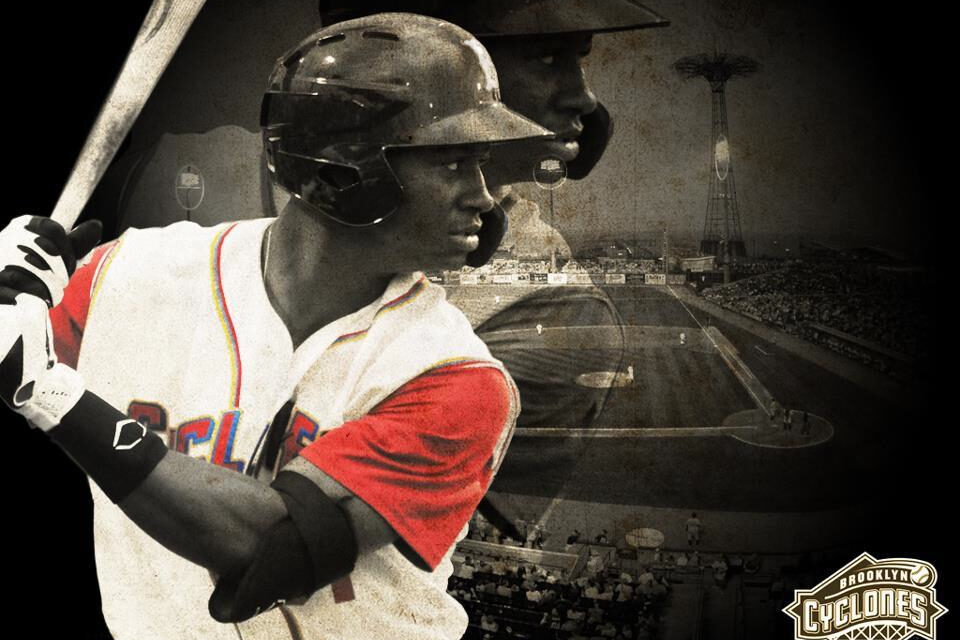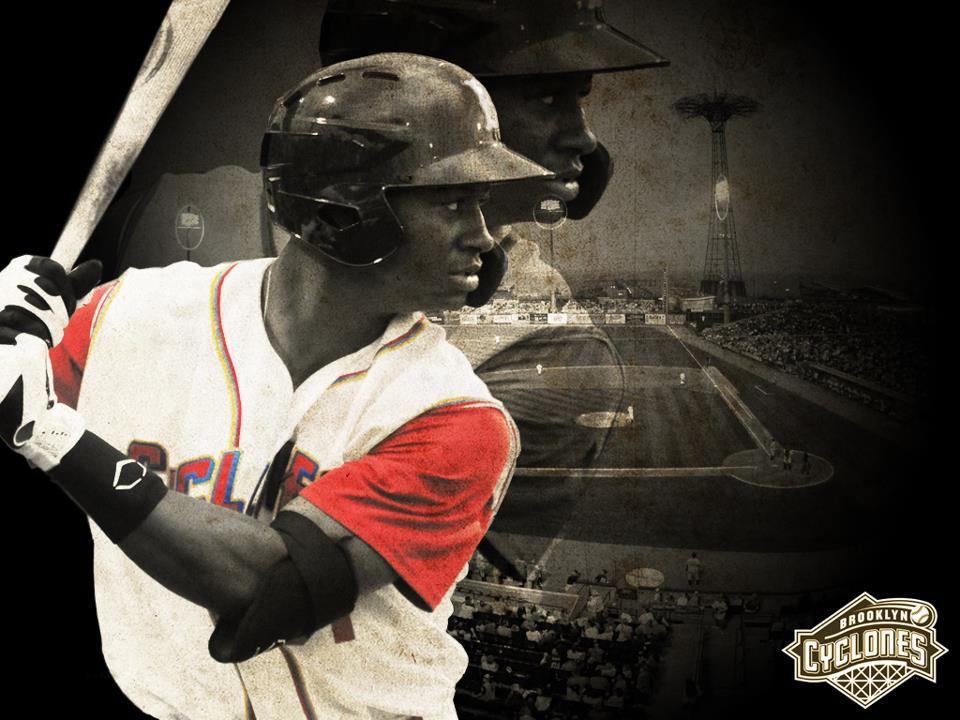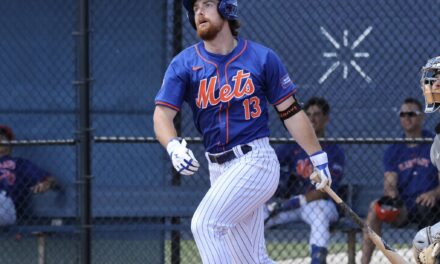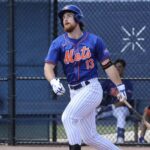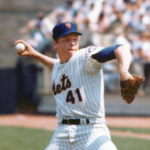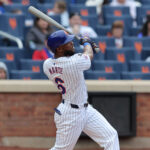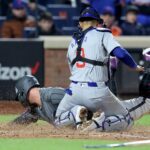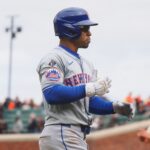As 22-year-old Tillman Pugh prepares for his third season as a minor leaguer in the Mets farm system. He is working hard with the realization of just how important this season will be for him. This is the year he will get the opportunity to open the season in a long season league. He should be the starting centerfielder for the Savannah Sand Gnats. He will have the opportunity to test himself and challenge himself over the course of a season that lasts well over five months. He could get to see what kind of numbers he can put up if he gets 450 to 500 AB’s in one year. He should do quite well. Tillman, 6’0″ 190 lbs., is fast and athletic enough to play centerfield. His game is speed and he represents something the Mets don’t have a lot of. A three-way threat, offense, defense, and on the base-paths. I caught up to Tillman the other day and he offered many insights and critiques of himself, and explained how his journey has gotten him to where he is today. Check out what Tillman had to say:
Petey: We are talking to New York Mets outfield prospect Tillman Pugh. First of all congratulations Tillman on a very successful second professional season! I’m sure you would agree with me that things went a million times better for you this year than in 2010. I’m sure you would also agree with me that it’s too bad you didn’t get more AB’s this past season, haha! But you finished the year very strong, getting to play in front of the awesome fans in Brooklyn, and helping the Cyclones get to the New York Penn League Play-offs, playing CF for them every day down the stretch. It must have been an exciting year for you I would imagine. Thank you so much for taking the time to answer some questions for our readers at MetsMerizedOnline.com. Are you back home in the Bay Area for the winter holidays? How are things?
Tillman: Thank you for the congrats Peter, I had a lot of fun this past season. I am currently back home in my hometown of Oakland, California getting ready for this important upcoming year.
Petey: When the Mets drafted you out of Sonoma State in the 15th round of the 2010 MLB Player Draft, how did you first hear about it, and what was that feeling like? Did you know the Mets were interested in drafting you? What round(s) were you thinking you might be taken in the draft?
Tillman: When I was drafted by the Mets, I was at the time playing college summer-ball in Longview, Washington for the Cowlitz Black Bears. On the second day of draft day we were having practice, knowing that there was a possibility of me being picked up by a team, I had my phone on hand at all times during practice which was OK with my coach Bryson Leblanc, who was just as excited about this day as I was. I got a call from my Mets Bay area scout, Doug Thurman, who was making sure I was still interested in signing and that they still wanted to pick me up, and that he would keep me updated. The news of me being drafted came to me via a local Longview, Washington reporter, who actually gave me the wrong information, telling me that I was once again drafted by the Seattle Mariners. This was a shock to me because out of all the teams I was in contact with that year, the Mariners were not one of them. However, regardless of how shocked I was, I was still very excited. So for about 20-30 minutes I thought I was drafted by the Seattle Mariners again in the 16th round, which is where I was selected the previous year when I was in Junior College. Until I received another phone call from Doug Thurman who told me that the Mets’ selected me in the 15th round, which made a little more sense to me. After finally receiving the correct news pertaining to what team actually drafted me, I began calling my parents and close friends to tell them the good news. I had very little idea of what team was interested in picking me up. I honestly didn’t care who picked me up or what round I was going, I just wanted an opportunity to continue playing the game my grandfather (Papa) taught me to love.
Petey: Was your grandfather your biggest influence to you as a young baseball player?
Tillman: My grandfather Roger Lee Thomas, was a pitcher for the Tulsa T Town Clowns in the early 1940’s, taught me the game of baseball at a very early age and I have loved it ever since. He also was influential in helping Mike Norris, Oakland A’s pitcher, throw the screwball. However, there have been other influential people in my life who have inspired me to chase my dreams. Maybe too many to name. I will say that my parents have always been there for me, supporting me in more ways than one. My experience at De La Salle High School, where I transferred to my junior year after a less than obedient track record when it came to previous schools. And my love and faith in my Lord and savior, Jesus Christ have all been the reason for why I am who I am, and why I am still doing what I love.
Petey: You had to struggle through some real adversity at the start of your professional career. In your first minor league AB, you were struck in the face with a pitch, and seriously injured. Not the kind of start you were looking for. Considering the thrill of of beginning your first professional season, it must have been extremely disappointing when that happened. How long did it take to work your way back? Were there any lingering effects? Do you feel you came back even stronger and more determined after something like that happened?
Tillman: Getting hit in the face on the first pitch of my first professional at bat was not something I think anyone could have foreseen. Definitely a rough start to my career, but surprisingly not the first time I had been hit in the face with a pitch. When I was hit the first time, it was during my Oakland Babe Ruth Little League Championship game against a team, and pitcher I despised. Now mind you when I was hit back then the pitcher wasn’t throwing nearly as hard, so the damage was not comparable to what happened last year, but I was still messed up. All I wanted to do after getting hit that first time was get up, take my base, and get even, which I did. I ended up stealing second, stealing third, and stealing home, swollen cheeks and all. All I wanted to do was continue playing and win a championship, which we did not do that day. Now when I was hit last year I broke 4 bones and ultimately needed surgery to put in place 3 plates to stabilize those bones. It took me a total of 5 weeks before I got back playing full time again, which to me was far too long. The only effects that still lingers is the loss of feeling i have in my upper gums on the left side of my mouth, where the surgeon cut me open to repair the damage. I feel that getting hit like that made me not only a stronger baseball player, but a stronger person in general. Baseball is all I’ve ever wanted to do, and I’m not gonna let something like getting hit in the face hold me back from achieving my dreams.
Petey: Wow, you are one tough hombre, my friend, just to add toughness to the list of things you do well. A big part of your game is your speed. You are fast enough to handle any outfield spot, steal bases, and hit at the top of the order. Do you have any times of yourself going home-to-first? Or first-to-third? Just curious. I would imagine trying to read pitchers to get a jump, and running on professional catchers, is a very challenging learning process. What are you working on specifically as far as base-running and stealing techniques these days? Who’s the most helpful coach you’ve worked with regarding your base-running?
Tillman: The only times I have are of me running home to first which I was timed anywhere from a 3.9 – 4.2, 4.1 – 4.2 consistently. In terms of getting better on the base paths I am in the gym working on proper running techniques by looking at videos of fellow Oakland native, and greatest base stealer of all time, Rickey Henderson. I try to emulate what he was able to do in terms of mechanics right now. I am also working on having a more explosive first step and shaving off as many fractions of a second as I can. I would say I have had three coaches who helped me a lot on my base running. Mookie Wilson, Jack Voigt, and Frank Fultz.
Petey: Do you consider yourself a centerfielder? Or an outfielder? How would you critique yourself defensively, what do you need to work on? On a scale of one-to-ten, one being a wet noodle, and ten being a bazooka, where would you rank your outfield throwing arm? Any one particular coach you have learned the most from as far as playing defense?
Tillman: I consider myself an outfielder first and foremost, I take a lot of pride in my defense, which was something that I took for granted in high school. I say that I’m an outfielder first because I feel very comfortable in all three outfield positions, center being my favorite by far. Centerfield is my favorite simply because I get to run down a lot more balls in either gap and make plays on the run. I would say I am an ok defender who can make a lot of plays, but who still has a lot to learn in terms of being a true professional outfielder. I am always ready to keep my ears and eyes open, and mouth shut in order to learn more. I am always trying to improve on my initial reads and jumps, the routes I take to cut off balls in the gaps, and thinking ahead of each play knowing exactly where the ball needs to go in any circumstance. In terms of my arm I would say that I have a sufficient enough arm to get balls where they need to be in a timely fashion in order to get guys out. I would give my arm a 6 or 7 out of 10, strengthening my arm is another one of my priorities this off-season. Once again I can’t just give credit to one of my coaches because I have been helped by so many. The coaches who I have learned from in the outfield are Mookie Wilson, Jack Voigt, Frank Fultz, Bobby Malek and Luis Rojas.
Petey: As a hitter, you strike me as a good contact swinger from the right-side, a line-drive hitter with occasional “pop.” Would you say that is accurate at this time? Can you add to that and give us your own idea as to what type of hitter you are now, and what type of hitter you may be down the road? Have the Mets been stressing any mechanical changes to your swing? Or has the coaching been more situational hitting, or a little of both? Has any hitting coach in the system been particularly helpful to you?
Tillman: I would say for the most part that is pretty accurate, I feel I have a little more pop than what people may give me credit for, but I need to work on putting myself in better positions to take full advantage of my potential power. Everything I’m working on now in terms of my hitting is about getting started early, knowing what pitches I can handle best and what part of the hitting zone that is. I’m working on a better bat path to help me stay in the hitting zone longer to give myself a great opportunity to make solid contact, and using my back side more to really get more out of each swing I take. Once again I have had a lot of help in regards to my hitting, whether it’s mechanical, situational, or a more mental approach. So I have to thank not just one coach, but a few. George Greer, Luis Rivera, Bobby Malek, Lamar Johnson, Frank Fultz, Sandy Alomar, and Tom McCraw.
Petey: To us die-hard Mets fans, we are very familiar with all of the coaches you named. Many of them have managed in the Mets system, and all have been around for a long time. It’s nice to know you guys are getting experienced coaching from some of the best. What was your favorite baseball team growing up? Your favorite player? Is there a major league player, past or present, that you think you are similar to in style? Or someone that you can see yourself playing like someday in the majors?
Tillman: My favorite team growing up was the Oakland, A’s. I played Little League baseball in the shadows of the Coliseum everyday. Our field was literally a couple blocks away from the stadium. I had several favorite players growing up, but the main three who I idolized were Rickey Henderson, Barry Bonds, and of course Ken Griffey Jr. I’ve never really thought about who I’m similar to in style of play, I like to think that I watch many different players and their styles and kind of take things from their game that I like, and implement them into my own arsenal or style. Since I am an outfielder most of the guys I watch and take things from are centerfielders. So with that said I would say I admire watching Curtis Granderson, Torii Hunter, and Andrew McCutchen, to me these are three of the best centerfielders in the game. These are guys who can do it with great speed, power, defense, throwing ability, and poise.
Petey: You are a true student of the game, that is very cool. What are your goals for next season? How will you prepare over the winter, and can you describe your workout regimen?
Tillman: My goals for next season are to make a full season club, stay healthy all year long, get moved up a level, improve upon all facets of my game, win a championship, and most importantly have fun. I am preparing right now this winter with a workout routine that I feel will pay off exponentially in the long run in terms of staying healthy, being faster, stronger, and more explosive. I’m focusing a lot on mobility and stability training. Making sure that my core and lower body are strong is the focus for me this off season.
Petey: Good solid goals Tillman, and all attainable. Pick one teammate, position player or pitcher, that really impressed you with his play this year at Kingsport, or at Brooklyn, and tell us what it was that made you take notice.
Tillman: I would say the guy who impressed me the most in Kingsport and Brooklyn was T.J. Rivera. T.J. is just one of those ball players who isn’t flashy or all about himself, he is the definition of a team player. A guy who knows how to handle a bat and put the ball in play. A guy who I think can play any infield position and make any play hit his way, he could probably thrive in the outfield too if the organization wanted him too. It wasn’t just T.J.’s selfless attitude and the way he came to work everyday that impressed me, it was the fact that he signed as a free agent and was among all these guys who were drafted and may have signed for big money. He had this confidence, swagger if you will, that you could easily see and feed off of. It wasn’t arrogance or a sense of entitlement, it was a belief in himself knowing that he is one hell of a ball player and person.
Petey: Awesome, hopefully I’ll get to have a chat with him one of these days. It’s been great chatting with you today Tillman, your answers have really been fascinating. To finish up, just a little personal info, not pertaining to baseball. What is your favorite movie?
Tillman: My favorite movie is a very tough question because I love so many different movies, however the one movie I can always watch and never get sick of has to be Remember the Titans. There are so many quotes from that movie I catch myself reciting on a regular basis. “Petey Jones, running-back. Theeee running-back y’all.”
Petey: How bout your favorite musician or band?
Tillman: Favorite musician is another tricky one for me, because if you know me at all, you know that I have a deep affinity towards all kinds of music. If I had to choose one band or musician I would have to choose Sade, not only because of the timeless hits she has put out over the years, but simply because my earliest memories of listening to music are those memories I have of my dad driving me to school every day in the morning, listening to Sade. To this day I hear a Sade song and regress back to my childhood days.
Petey: Favorite food?
Tillman: As for food, I love all food, but my go to comfort food is definitely Asian cuisine in general, and above all else, sushi.
Petey: Hey thanks again Tillman for taking time out for this interview. The readers and staff at MMO really appreciate it! Have a very happy, and healthy holidays, and enjoy your time off this winter. We’ll see ya at spring training!
What a great guy and a driven competitor! I look for really big things from Tillman Pugh this year. We’ll keep a close watch on him coming out of spring training 2012. I hope you enjoyed the interview.

